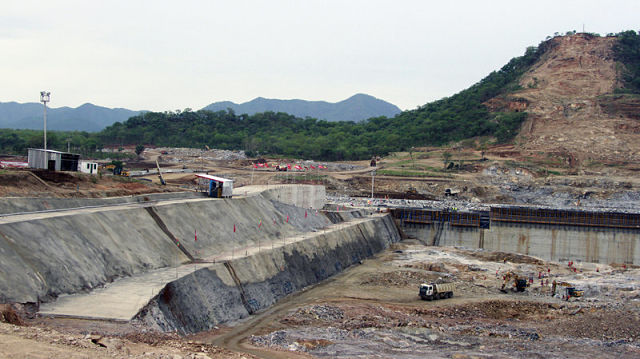 The Grand Ethiopian Renaissance Dam is under construction near Assosa, Ethiopia. (AP Photo)
The Grand Ethiopian Renaissance Dam is under construction near Assosa, Ethiopia. (AP Photo)
Gregory Warner
I once met a popular spoken word poet in Ethiopia who was asked by a government official to write a poem about the Grand Ethiopian Renaissance Dam. (He politely explained that he didn’t do poetry about infrastructure.) But it’s not surprising that Ethiopia would like to inscribe this dam into the Ethiopian epic.
When completed, the Renaissance Dam promises to be the largest hydro-electric project in Africa. Funded without help from America or the West, the “renaissance” in the dam’s title refers to a 70-year-old vision of Africa rising on the strength of its own abundant resources. Independence and self-reliance in the so-called “dark continent” begins with electricity.
But since Ethiopia began construction in 2011, Egypt has spun the dam as a threat. Egypt’s way of life depends on the Nile River. Former president Mohammed Morsi once warned that every drop of water stolen from the Nile would be defended by a drop of Egyptian blood.
In fact, a hydropower dam doesn’t steal water from downstream. It only draws power from its flow. Except during one crucial period: just after the dam is built and the reservoir is filled. A reservoir this huge will hold 63 billion cubic meters — roughly as much water as Egypt gets from the Nile over the course of a year. If the basin were to be filled too fast, Egypt’s farmers would plunge into drought and its own hydropower dams would stop producing electricity.
Fear of that scenario is why Egypt’s former president almost went to war with Ethiopia over the dam.
Instead, on Monday, Egypt’s current president Abdel Fattah el-Sisi and Ethiopia’s Prime Minister Hailemariam Desalegn signed a “Declaration of Principles” with Sudan’s president as broker. Egypt approved the project and will have rights to some of the electricity that will be generated. The key negotiations to come will be over the pace of filling that giant reservoir when it’s completed in the next few years. Fast enough to satisfy Ethiopia’s grand ambitions but slow enough not to hobble Egypt’s economy.
Read more at NPR »
—
Related:
Egypt, Ethiopia and Sudan Sign Deal to End Nile Dispute (Video)
Egypt’s President Addresses Ethiopian Parliament
Join the conversation on Twitter and Facebook.

























